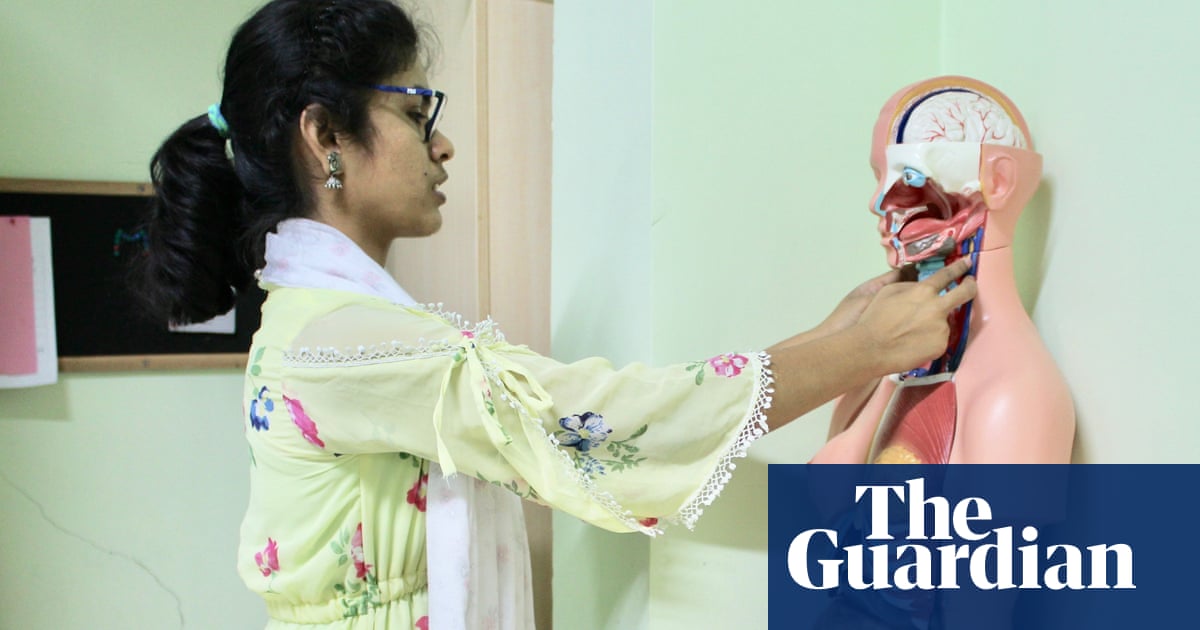
The most satisfying part of Ritika Maurya’s work is reassuring the anxious. “Women fear coming for breast examinations,” says Maurya. “What if a lump is found in my breast? Will that be the end of my life? These are some of the questions that haunt them all the time.”
Maurya is, she says, “still learning to be good at this”. As a blind child, she had a sheltered upbringing with protective parents who rarely let her leave the house.
Now aged 23, she is a trainee medical tactile examiner (MTE) at Enable India, a disability rights organisation in the southern city of Bengaluru – part of a project where visually impaired women are taught to use touch to detect breast lumps or changes that might mean a lurking cancer.
Maurya chats with her clients about their day, offers them water and holds their hands. She loves her work.
Devised by a German gynaecologist, Dr Frank Hoffmann, through his social enterprise Discovering Hands, the method was brought to India in 2017 and has also expanded to Colombia, Mexico, Austria and Switzerland. However, the programme has been paused in Colombia and Mexico since the pandemic.
Visually impaired women use braille-marked documentation tapes to measure the breast centimetre by centimetre. Each examination lasts 30-40 minutes and findings are passed on to a doctor who decides on any further assessment.
MTEs can detect “lumps as tiny as 6-8mm, as opposed to the larger, 10-20mm ones sighted physicians are able to find”, Hoffman says. His system was introduced in India by the NAB India Centre for Blind Women and Disability Studies (NABCBW) in Delhi, where a study this year of tactile examinations on 1,338 women found 78% of malignant cancers were detected and only 1% missed.
An earlier study in 2019 comparing the diagnostic accuracy of doctors and visually impaired MTEs found “clinical breast exams by MTEs with impaired vision appear to have an accuracy level similar to that of examinations by physicians or a combination of both”.
Training was expanded to Bengaluru in 2020 by Enable India. Its founder, Shanti Raghavan, says they want breast-cancer screening to be available in “every village” of India.
Since 2017, 18 MTEs have been trained in Bengaluru and Delhi; six are now employed in cancer hospitals. The next eight trainees, of whom Maurya is one, are about to graduate and the next cohort will be chosen soon after.
Breast cancer is the most commonly diagnosed cancer worldwide. In India, it is the leading cause of death from cancer among women, but 60% of cases are diagnosed at stage three or four of the disease, resulting in a significant reduction in survival rates.
MTEs are a useful tool in the fight to change that picture says Dr Poovamma CU, a surgical oncologist at Cytecare, a hospital in Bengaluru that employs two of the women.
“Women are uncomfortable about doing breast self-examinations and often don’t realise there’s a lump in their breast until it has grown to 4cm or 5cm,” she says.
“Routine breast cancer screenings by MTEs in urban and rural communities and workplaces, where mammograms and ultrasound machines cannot reach, can make a significant impact in India, where robust government-run screening programmes don’t exist,” she says.
Maurya, who has no vision in one eye and can only see shapes from the other, says her impairment heightens her tactile abilities – and science supports her. A blind examiner also means women feel more comfortable undressing, she says.
Moving 1,300km (830 miles) away last July to Bengaluru, where she shares a room with another trainee, was a huge step for Maurya, whose world in Indore had been restricted to her home and family: her parents did not let her leave the house alone. “They would say: ‘What if you bump into something and hurt yourself?’” she says.
“I felt awkward and uncomfortable talking to anyone, thinking that I had no talent and skills.”
There are estimated to be 15 million women in India with visual impairment but only 5% of them have a chance to earn a living, according to NAB.
For Maurya, the programme struck her as a rare opportunity.
“I wanted to prove myself and show others that I could survive in this world,” says Maurya, who convinced her parents to let her try it.
At Enable India, Maurya was given a white cane and mobility training so she could start moving independently from the NGO to her accommodation.
She learned human physiology and anatomy, using 3D models, and was awe-struck, realising how much she had missed out on. “I felt, ‘oh, I could have studied science in school as well’, if only if I was taught through the ‘touch and feel’ methodology,” Maurya says.
In the past year, the trainees have trekked to Thottikallu Falls, 30 miles from Bengaluru, and played golf for the first time. Maurya’s next step is a three-month internship at a Bengaluru hospital.
“The training has helped me accept my disability,” she says. “Being an MTE gives me the feeling that I have a unique quality to do something that only I can do as a disabled woman.”











